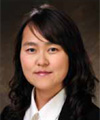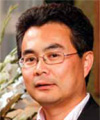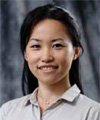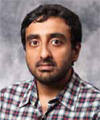New Faculty 2011-2012

Regine Choe
Assistant Professor of Biomedical Engineering
Regine Choe received her BS in physics from the Pohang University of Science & Technology in Korea, and her PhD degree in physics and astronomy from the University of Pennsylvania (2005). Her doctoral research was on the diffuse optical tomography and spectroscopy of breast cancer and fetal brain. Diffuse optical techniques (including tomography and spectroscopy) based on near-infrared light illumination have a great potential for detection and therapy monitoring of disease by providing information on several unique deep tissue hemodynamic and metabolic parameters. She continued her postdoctoral research at the University of Pennsylvania and received the Howard Temin Pathway to Independence Award (K99/ R00) from NIH.
She joined the biomedical engineering department as an assistant professor in January 2011. Her current research focus is on the development, validation, and clinical translation of diffuse optical techniques for the breast cancer therapy monitoring. Her study incorporates various tools from disciplines such as physics, optics, engineering, computer science, biochemistry, biology, and medicine. She plans to expand the applications of diffuse optical techniques to other human diseases and organs in the future. In addition to her research, Regine loves to try new things. Among these, science fiction movies, international food, flying, and figure skating are her current favorites.

Jonathan D. Ellis
Assistant Professor of Mechanical Engineering and of Optics
Jonathan D. Ellis earned his PhD in mechanical engineering from the Delft University of Technology (The Netherlands) in 2010. Prior to that, Jon studied at the University of North Carolina at Charlotte, where he received both his MS and BS, also in mechanical engineering. Jon currently has a joint appointment as an assistant professor at the University of Rochester with the Department of Mechanical Engineering and the Institute of Optics.
Ellis’s research is on designing and building novel instruments that allow the measurement of precision optical surfaces that have been manufactured in several different ways. Such measurements may improve the capabilities of precision manufacturing platforms. He is also interested in system integration for precision metrology tools onto existing precision systems or designing scratch-built systems for custom applications. Current research projects are in designing and developing smart optical sensors for compact, remote displacement sensing and for many degrees-of-freedom interferometry. In addition to those, Jon is interested in linear displacement interferometry and laser design and applications such as high-power gas laser frequency stabilization, and in refractometry, flexure systems for instrumentation and machining platforms, stage metrology, precision machine design, and capacitance sensor design.

Jiebo Luo
Associate Professor of Computer Science
Jiebo Luo joins the University of Rochester after 16 years at Kodak Research Laboratories, where he was a senior principal scientist leading research and advanced development. He has been involved in numerous technical conferences, including serving as the program cochair of ACM Multimedia 2010 and IEEE CVPR 2012. He is the editor-in-chief of the Journal of Multimedia, and has served on the editorial boards of the IEEE Transactions on Pattern Analysis and Machine Intelligence, IEEE Transactions on Multimedia, IEEE Transactions on Circuits and Systems for Video Technology, Pattern Recognition, Machine Vision and Applications, and Journal of Electronic Imaging. He is a fellow of the SPIE, IEEE, and IAPR.
His research spans image processing, computer vision, machine learning, data mining, medical imaging, and ubiquitous computing. He has been an advocate for contextual inference in semantic understanding of visual data, and continues to push the frontiers in this area by incorporating geolocation context and social context. A recent research thrust focuses on exploiting social media for machine learning, data mining, and human computer interaction, for example, mining the wisdom of crowds for social, political, and economic prediction and forecasting. He has published extensively with over 180 papers and 60 US patents.

Hitomi Mukaibo
Assistant Professor of Chemical Engineering
Hitomi Mukaibo joined the department of chemical engineering at the University of Rochester in July 2011. She earned her degrees in engineering from Waseda University, PhD (2006), ME (2004), and BS (2002). In Waseda University, her research focus was in the development of novel materials for high-energy lithium-ion batteries. After obtaining her PhD, she decided to expand the horizon of her expertise and to pursue her interest in the biology-related fields. She changed her research focus from batteries to biosensors and bio/nanoscience. She moved to Florida and worked as a postdoctoral researcher for Charles R. Martin at the University of Florida, where she studied nanopore materials to detect proteins. She also developed nanostructured platforms to deliver foreign genes to algal cells for gene transformation. Based on this training, her current research interests include materials science, electrochemistry, biosensors, bio/nanoscience, bioanalytical chemistry, energy, and chemistry at interfaces.

Nick Vamivakas
Assistant Professor of Optics
Nick Vamivakas studied electrical engineering at Boston University receiving his PhD in 2007. During this time, he developed high-resolution microscopy and spectroscopy techniques to study the electro-optic properties of individual nanostructures. Following his PhD, he was a postdoc from 2007–2011 in the Cavendish Laboratory at the University of Cambridge. Nick joined the Institute of Optics in 2011 and currently is an assistant professor.
Nick’s main research interests are in how quantum mechanical effects manifest themselves in optics experiments. He currently investigates new features that arise in traditional quantum optics experiments when the material system, typically an atom, is replaced by an artificial atom such as a semiconductor nanostructure. This will provide a new avenue to understand the basic features of how light interacts with matter. In parallel he is also developing nanoscale optical sensors. By exploiting aspects of quantum physics, he plans to realize a new generation of sensors capable of measuring sample properties on length scales not accessible with a conventional optical microscope.

Muthuramakrishnan Venkitasubramaniam
Assistant Professor of Computer Science
Muthuramakrishnan Venkitasubramaniam received his BTech degree in computer science from the Indian Institute of Technology, Madras in 2004. He attended Cornell University, where he worked with Rafael Pass receiving his PhD in computer science in 2010. Before arriving at Rochester, he spent a year at the Courant Institute of Mathematical Sciences (NYU) as a postdoctoral researcher supported by the Computing Innovation Fellowship. His research is in cryptography and its interplay with complexity theory, in particular: understanding secure composition of cryptographic protocols, minimal assumptions required for efficient constructions, intrinsic complexity of cryptographic primitives, and basing cryptography on NP-hardness. As part of his dissertation, he proposed a unified framework to efficiently realize any secure multiparty computation task with concurrent security; some examples of such tasks include anonymous electronic elections, privacy-preserving auctions, and faulttolerant distributed computing.
